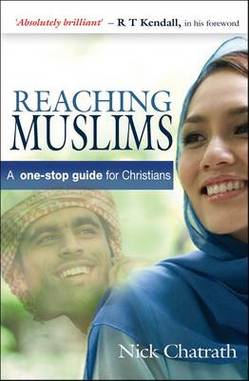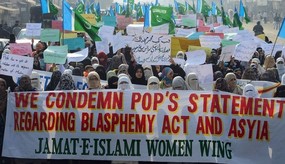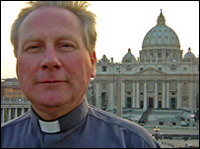Jean-Louis Cardinal Tauran, president of the Pontifical Council for Interreligious Dialogue, spoke Monday (November 18) at the opening general assembly of the two-day Global Forum of the King Abdullah Bin Abdulaziz International Centre for Interreligious and intercultural Dialogue, Vienna, Austria.
The senior cardinal deacon Tauran used an insightful term that needs to developed, ‘intelligence of the heart,’ which he explains that “inspires us to respect what God is accomplishing in every human being” during the opening session of an inter-religious forum in Vienna, Austria, on Monday morning.
The difficulty raised with inter-religious dialogue with Muslims is the concept of the other person; Islam does not hold that people are made in the image and likeness of God. Catholics and Jews do and do so as fundamental to all else. And there is good reason to ask why we spend so much time and money on inter-religious dialogue when there is no identifiable goal to the work done. It seems doubtful that serious Muslims and serious Christians have one goal: conversion to the Truth: Christians ought to convert Muslims and Muslims convert Christians. Once admitted, then we can have a fruitful dialogue. But that will never happen. Nevertheless, what Cardinal Tauran states is serious and we ought to consider seriously what it means to live in a religiously diverse world.
The Cardinal said:
We are living in a changing world. We are living more and more in a ‘provisional’ world. But many people rediscover that we cannot live without reference to history and especially without relation to our contemporaries, their joys and hopes, their griefs and anxieties. In such a context religions are called to propose – not to impose – reasons for living.
What is at the centre of our concern is the human person, man and woman. The human person is the object of the attention of political and religious leaders. Each one of us is a citizen and a believer. All of us belong to the same human family. It means that we share the same dignity, we are confronted by the same problems, we enjoy the same rights and we are called to accomplish the same duties.
But unfortunately, we have to recognize that too often: we judge people on their appearance or on their ‘production’, even though every human person is much more than how he or she appears or is able to produce; we reduce the human person to an object (I am thinking of all the problems raised by bio-technology), while the human person transcends his/her material dimension.
Interreligious dialogue teaches us: to be careful not to present the religion of the other in a bad light in schools, universities, the mass media and, in particular, in the religious discourse; not to demean the religious convictions of the others, especially when they are not present; to consider diversity – ethnical, cultural, vision of the world – as richness, not as a threat.
Interreligious dialogue impels us: to listen and to better know each other; to think before judging; to present the content of our faith and our reasons for living with “kindness and respect.”
Therefore, interreligious dialogue can contribute to: give to God again the place which He deserves; to inspire fraternity; to give the wisdom and courage to act.
To look at the theme “The Image of the Other” is also to look within ourselves in order to purify all that makes us closed to what is new and true; to look at the other means also to accept being questioned by him about our faith and to be ready to give an account of it; to look at the other is to be available to work with all persons of good will for the common good.
One of the tasks of KAICIID could be the promotion of what I dare to call, “the intelligence of the heart,” which inspires us to respect what God is accomplishing in every human being and at the same time to respect the mystery that every human person represents. What we have to avoid absolutely is that religions engender fear, attitudes of exclusion or of superiority in people.
In concluding, I express my heartfelt wishes for the success of this meeting. It will send a very significant message if KAICIID can become a place where we can take time to look at each other, to better know each other and to share all our abilities in order to make this world more secure and enlightened, with all its inhabitants living in the spirit of respect and friendship that Pope Francis has repeatedly said, “To encounter all because we all have in common our having been created in the image and likeness of God.” (To Participants in the Plenary of the Pontifical Council for Promoting the New Evangelization, 14 October 2013)


